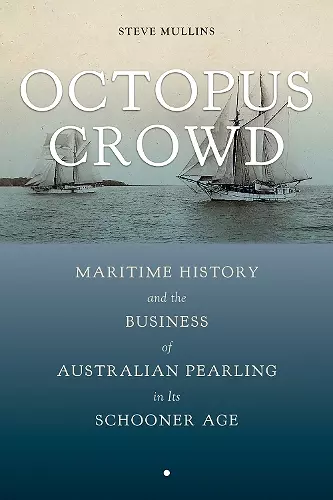Octopus Crowd
Maritime History and the Business of Australian Pearling in Its Schooner Age
Format:Hardback
Publisher:The University of Alabama Press
Published:30th Aug '19
Currently unavailable, and unfortunately no date known when it will be back

A detailed study of the origins and demise of schooner-based pearling in Australia.
For most of its history, Australian pearling was a shore-based activity. But from the mid-1880s until the World War I era, the industry was dominated by highly mobile, heavily capitalized, schooner-based fleets of pearling luggers, known as floating stations, that exploited Australia's northern continental shelf and the nearby waters of the Netherlands Indies. Octopus Crowd:Maritime History and the Business of Australian Pearling in Its Schooner Age is the first book-length study of schooner-based pearling and explores the floating station system and the men who developed and employed it.
Steve Mullins focuses on the Clark Combination, a syndicate led by James Clark, Australia's most influential pearler. The combination honed the floating station system to the point where it was accused of exhausting pearling grounds, elbowing out small-time operators, strangling the economies of pearling ports, and bringing the industry to the brink of disaster. Combination partners were vilified as monopolists—they were referred to as an ""octopus crowd""—and their schooners were stigmatized as hell ships and floating sweatshops.
Schooner-based floating stations crossed maritime frontiers with impunity, testing colonial and national territorial jurisdictions. The Clark Combination passed through four fisheries management regimes, triggering significant change and causing governments to alter laws and extend maritime boundaries. It drew labor from ports across the Asia-Pacific, and its product competed in a volatile world market. Octopus Crowd takes all these factors into account to explain Australian pearling during its schooner age. It argues that the demise of the floating station system was not caused by resource depletion, as was often predicted, but by ideology and Australia's shifting sociopolitical landscape.
Octopus Crowd is well written and copiously illustrated, clearly revealing the challenges and risks facing the pioneers of the pearling industry."" - Malcolm Tull, President of the International Maritime History Association and author of A Community Enterprise: The History of the Port of Fremantle, 1897 to 1997
""There is no other book remotely like Octopus Crowd. It has a diverse reading audience and is of international interest. It is finely textured and well written."" - Clive Moore, author of Making Mala: Malaita in Solomon Islands, 1870s–1930s and Kanaka: A History of Melanesian Mackay
ISBN: 9780817320249
Dimensions: unknown
Weight: 665g
296 pages